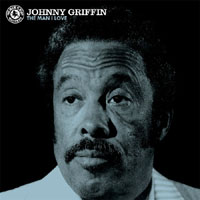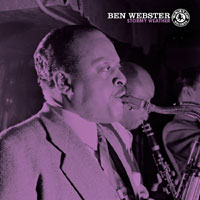Johnny Griffin • The Man I Love
Ben Webster • Stormy Weather
ive albums give you a sense of time and place, a feeling like you were there, in a way that even the greatest studio albums cannot duplicate -- a feeling that you are within a space and time surrounded by other anxious music fans sharing in a common enterprise. It’s not so much different from the experience of watching a movie in a theater as opposed to seeing it at home. You may gasp as Scotty slides off the roof in Vertigo and catches himself by his fingertips on the gutter, but it’s not the same as participating in the crowd’s collective intake of breath that the scene creates in a packed theatre. The same holds true with live music, and to an even greater degree, because the energy flows both ways. The musicians feed off the audience, creating a circuit of feedback that amplifies the pleasure and excitement on both sides of the stage. The audience forgets about its role at a concert. While some settings demand silence, others abhor it. Lightnin’ Hopkins made a telling observation when he left the safe confines of Houston to play across the country as part of the newly developed college blues and folk scene of the 1960s. He couldn’t understand why those kids were so damn quiet during the performance, clapping along but never uttering a sound. That’s not what he was used to in the nightclubs and juke joints he usually played. These two outstanding releases from ORG Music document some of the best live jazz captured by Black Lion Records, a London-based label founded by producer Alan Bates. Both sessions were captured at the Montmartre Jazzhus in Copenhagen. Ben Webster recorded Stormy Weather in 1965, shortly after he moved to Europe, where he spent the last nine years of his life. European youth were still in the discovery phase of absorbing American music and pop culture in 1965, and their appetite for American jazz attracted many greats tired of what seemed like indifference to their art at home. One can imagine the Jazzhus packed with a young crowd of fans discovering Ben Webster the same way their contemporaries on the other side of the pond had discovered the Beatles a few years earlier. But this crowd was more beatniks than crazed young girls. Their fascination with the music was well rewarded that evening when Webster recorded one of his best performances during his time in Europe. Accompanied by Kenny Drew on piano, Niels-Henning Ørsted Pedersen on bass and Alex Riel on drums, Webster proved that at the age of 55 he was still at the peak of his expressive powers. On a set of mostly standards, and mostly ballads, Webster's trademark tenor sweetness and warmth come through. Given how quickly this session was thrown together after Webster’s arrival in Europe, the sound is amazingly good. Webster’s tenor is captured perfectly, lacking only that last bit of dimension of some of his best (and truly great-sounding) studio releases. One can feel the club surrounding the group, and the audience noise adds to the performance without being intrusive with dropped plates and scraping chairs. Johnny Griffin, while playing in the same club two years later with an almost identical band (Albert “Tootie” Heath substitutes on drums), is a very different style of tenor player. Known for his ability and predilection for playing lots of notes and playing them fast, Griffin could also do equal justice to a ballad. A relative youngster at 38 when he recorded this session, Griffin laid down two tracks of over 12 minutes each. In one of them, "The Man I Love," Griffin adds almost Coltrane-like runs to a piece often associated with Billie Holiday’s languid pacing, and the combination works splendidly. He also delivers two ballads, "Hush-A-Bye" and "Sophisticated Lady" with almost Ben Webster-like lushness and pace. Like the Webster LP, this live recording is first rate, suffering only on occasion when Griffin may have veered a bit too close to the microphone. Neither of these is among the handful of Black Lion
titles that turn up with great regularity in used-record bins. These reissues, freshly mastered by Chris Bellman at
Bernie Grundman Studios and pressed on flawless 180-gram vinyl at Pallas, bring better
sound to the (turn)table than ever before. Both are
available as a package of 45 and 33rpm LPs from Music Direct, or as a less expensive
33rpm-only LP from the usual vendors. The 45rpm
versions add the last bit of detail to what are already great-sounding LPs. |


